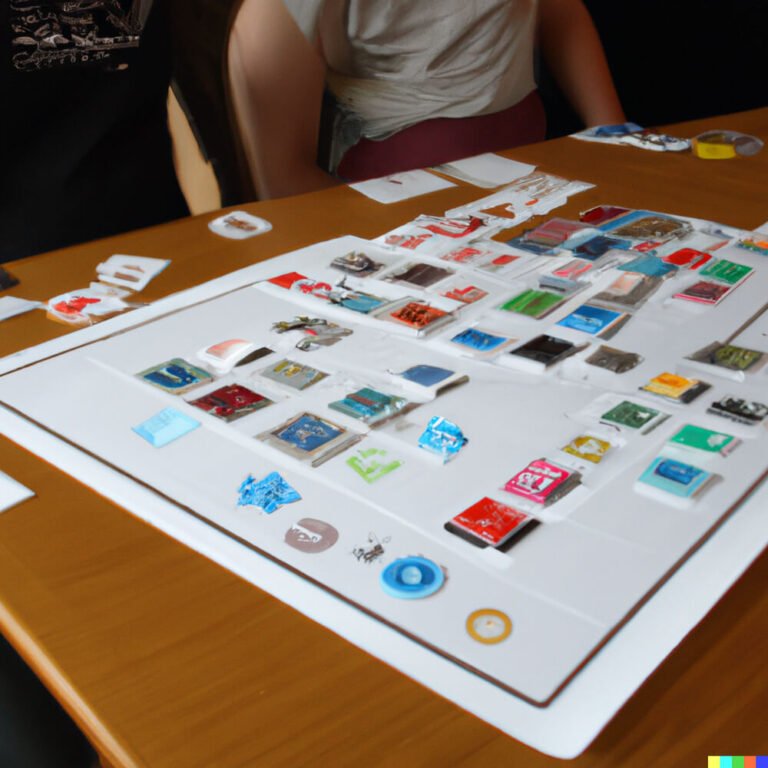Imagine gathering around a table with friends and family, engaging in friendly competition and strategic thinking. This is the allure of all time classic board games. From challenging your opponents in chess to building your real estate empire in Monopoly, these games have captivated generations and continue to bring joy to players of all ages.
In this article, we will delve into the rich history and evolution of board games, explore some iconic favorites like Scrabble and Risk, and embark on imaginative adventures in Dungeons & Dragons. Get ready to embrace the legacy of all time classic board games and create timeless memories.
Board games have been enjoyed by civilizations for thousands of years, transcending time and culture. The origins can be traced back to ancient Egypt, where the game of Senet was played as early as 3000 BCE.
Throughout history, board games have evolved in various forms across different regions, reflecting cultural values and societal dynamics. From strategic war games played by medieval knights to parlour games enjoyed by Victorian elites, these early iterations laid the foundation for the beloved classics we know today.
- One such classic is chess – an iconic strategy game that has stood the test of time. Dating back over 1,500 years, chess continues to fascinate players with its intricate moves and calculated maneuvers. Known as “the game of kings,” it has been cherished by thinkers, strategists, and enthusiasts alike for centuries. With its timeless appeal, chess demonstrates how a simple board game can transcend generations and become a symbol of intellectual prowess.
- Another favorite among board game enthusiasts is Monopoly – an all-time favorite capitalistic adventure that transports players into a world where buying property leads to victory. First introduced in the early 20th century, Monopoly quickly became a sensation worldwide.
It offers not only an opportunity for players to engage in cutthroat business deals but also provides a snapshot of economic systems at play within society. Through landing on spaces like Boardwalk or Park Place, individuals experience the allure and challenges of the real estate market in a fun and competitive setting.
The Origins of Board Games
Board games have been enjoyed by people around the world for centuries, providing entertainment, challenge, and social interaction. The origins of board games can be traced back thousands of years, making them a timeless form of leisure activity. From ancient civilizations to modern society, board games have evolved and adapted to reflect the changing times and cultural influences.
The history of board games dates back as early as 3100 BC with the game of Senet in Ancient Egypt. This game was played on a board shaped like a grid, with players moving their pieces based on the roll of dice. Board games continued to evolve throughout history, spreading across different continents and gaining popularity among various cultures.
One popular board game that has stood the test of time is chess. Originating in Northern India during the 6th century AD, chess quickly gained recognition as a strategic game that required skill and cunning. It spread throughout Asia and eventually reached Europe in the 9th century, where it became widely embraced by nobility and intellectuals.
Another ancient board game that has endured is Backgammon. With origins dating back over 5,000 years ago in Mesopotamia (modern-day Iraq), Backgammon has remained a beloved game throughout history. Its gameplay involves strategy and luck as players race to move their pieces across the board.
Board games have not only entertained individuals but also provided educational benefits throughout history. For example, the Royal Game of Ur in Ancient Mesopotamia was used to teach counting skills and reinforce mathematical concepts. Similarly, many modern educational board games are designed to enhance critical thinking skills or teach specific subjects.
The Immortal Chess
Chess is often regarded as one of the most iconic and beloved strategy games of all time. Dating back to the 6th century, it has stood the test of time and continues to captivate players around the world. With its intricate rules and endless possibilities, chess offers a unique and rewarding gaming experience that has made it a timeless classic.
The origins of chess can be traced back to ancient India, where it was known as chaturanga. From there, it spread to Persia and then to the Islamic world, where it gained popularity among scholars and rulers. By the 9th century, chess had reached Europe and underwent significant changes in both its rules and appearance.
One of the reasons why chess has endured for centuries is its universal appeal. Regardless of age or cultural background, people from all walks of life can enjoy this game. The strategic thinking required in chess allows players to exercise their analytical skills, foresight, and problem-solving abilities. It also encourages creativity and adaptability as players must constantly adjust their strategies in response to their opponent’s moves.
In addition to being a game of skill, chess is also steeped in history and tradition. Each piece on the board represents a different character from medieval times – kings, queens, knights, rooks, bishops, and pawns – adding a layer of storytelling to the game. Chess tournaments have become internationally recognized events, showcasing the immense talent and dedication of players who have spent years perfecting their craft.
| Chess Facts | Data |
|---|---|
| Year Chess Originated | 6th Century |
| Number of Possible Game Combinations | Approximately 10^120 |
| World Chess Champions | Throughout History |
Despite the rise of digital gaming, chess has maintained its popularity and continues to be played both online and offline. The advent of the internet has even made it easier for players around the world to connect and compete with each other. In recent years, competitive chess has witnessed a resurgence with the emergence of prodigious young players and popular streaming platforms.
Chess truly stands as a testament to the power of strategy, intellect, and human ingenuity. It is not merely a game but an art form that challenges us to think several moves ahead, strategize under pressure, and appreciate the beauty of intricate maneuvers. Whether played casually or competitively, chess offers an enduring appeal that will likely keep it relevant for centuries to come.
Monopoly
Monopoly is undoubtedly one of the most beloved and iconic board games of all time. With its origins dating back to the early 20th century, Monopoly has captivated players for generations with its exciting gameplay, strategic decision-making, and endless opportunities for wealth accumulation. In this section, we will delve into the history and features that have made Monopoly a timeless classic.
Originally named “The Landlord’s Game,” Monopoly was invented by Elizabeth Magie in 1903 as a critique of capitalism and monopolies. However, it wasn’t until Charles Darrow tweaked the game’s rules and layout in the 1930s that it gained widespread popularity. Hasbro acquired the rights to Monopoly in 1991, solidifying its status as a cultural phenomenon.
What sets Monopoly apart from other board games is its focus on economic strategy. Players navigate a game board representing different properties, aiming to buy, trade, and develop them while collecting rent from opponents who land on their spaces. The game’s objective is to bankrupt your opponents through careful financial maneuvering and astute decision-making. The introduction of Chance and Community Chest cards adds an element of unpredictability, further challenging players’ strategies.
| Fact | Data |
|---|---|
| Number of languages Monopoly has been published in | 47 |
| Estimated number of Monopoly sets sold worldwide | Over 275 million |
| The longest recorded game of Monopoly | 70 days |
| The record for the largest number of people playing Monopoly simultaneously | 605 |
Monopoly’s enduring popularity can be attributed to its ability to engage players of all ages. Whether it’s the joy of acquiring sought-after properties, the thrill of striking lucrative deals, or the satisfaction of outwitting opponents, Monopoly continues to provide hours of entertainment and friendly competition. Its universal appeal has also led to numerous adaptations and themed editions, featuring popular franchises such as Disney, Star Wars, and even Game of Thrones.
As we explore other classic board games in this article, we invite you to rediscover the exhilaration that comes with embarking on a capitalistic adventure in Monopoly. Gather your friends and family around the table for a game that has stood the test of time and remains an all-time favorite for players worldwide.
Scrabble
Scrabble is a classic board game that has been captivating players for decades with its unique blend of wordplay and strategic thinking. In this section, we will explore the appeal of Scrabble and how it can enhance your vocabulary skills while challenging your ability to think strategically.
The Basics of Scrabble
Scrabble is played on a square board divided into a grid of cells, with each cell assigned a specific letter value. Players take turns forming words on the board using their set of letter tiles. The goal is to score the highest number of points by strategically placing letters on bonus squares and maximizing the value of each word formed.
One of the most exciting aspects of Scrabble is its adaptability to different skill levels. Casual players can enjoy a friendly round, while more competitive players can participate in tournaments and take their gameplay to new heights.
Expanding Your Vocabulary
Scrabble is not just a game; it is also an excellent tool for expanding your vocabulary. As you play, you are constantly challenged to form words using different combinations of letters. This encourages players to explore new words, learn their meanings, and improve their language skills.
By playing Scrabble regularly, you can effortlessly discover new words that you may not have encountered otherwise. It becomes an enjoyable way to expand your vocabulary while engaging in friendly competition with friends or family members.
Strategic Thinking in Scrabble
While having an extensive vocabulary is certainly advantageous in Scrabble, strategic thinking plays a crucial role in achieving victory. To succeed in this game, players must carefully plan their moves, considering factors such as word placement, potential future moves, and scoring opportunities.
Strategic considerations include creating words that connect with existing ones on the board to maximize points gained from multiple directions, utilizing high-value tiles efficiently, and blocking opponents’ access to bonus squares. Skillful players often employ tactics such as bluffing, setting up traps, and creating word combinations that can lead to high-scoring opportunities.
Risk
Risk is a classic board game that has captivated players for decades with its thrilling gameplay and strategic challenges. In this territorial warfare game, players aim to conquer the world by strategically deploying their armies, planning attacks, and defending their territories. Risk offers an immersive experience that allows players to showcase their decision-making skills and tactical thinking.
One of the key features of Risk is its expansive map that represents the world divided into different territories. Players take turns to place their armies strategically across these territories, aiming to control as many regions as possible. The game involves both diplomacy and conflict, as players negotiate alliances or engage in battles to gain control over territories. This combination of strategy and luck creates an exciting gaming experience that keeps players engaged throughout.
To play the game, players must think critically about how to best distribute their armies across the map and formulate effective attack or defense strategies. The element of risk also adds an unpredictable nature to the game, as outcomes of battles are determined by dice rolls. This can lead to unexpected turnarounds and upsets, keeping players on their toes until the very end.
In addition to its gameplay mechanics, Risk fosters social interaction and friendly competition among players. It encourages negotiation and diplomacy as players form alliances or negotiate truces with each other. This aspect of the game adds another layer of complexity and excitement as players strategize not only against the game mechanics but also against fellow opponents.
Overall, Risk stands out as a timeless classic that combines strategy, diplomacy, and luck in a quest for global domination. Its enduring appeal lies in its ability to create adrenaline-pumping moments, stimulate critical thinking skills, and bring people together for epic battles on the board. Whether you’re an experienced player or new to board games, Risk promises hours of challenging fun and intense competition for all who dare to embark on this global conquest.
The Enchanting World of Dungeons & Dragons
Dungeons & Dragons (D&D) is a beloved board game that has captured the hearts and imaginations of players for decades. In this immersive role-playing adventure, players embark on epic quests in a fantasy world filled with magic, monsters, and endless possibilities. The game combines elements of storytelling, strategy, and teamwork to create an unforgettable gaming experience.
One of the key aspects that sets Dungeons & Dragons apart from other board games is its role-playing element. Players create their own characters, giving them unique qualities such as race, class, skills, and abilities.
They then navigate through a series of adventures guided by a Dungeon Master (DM), who acts as the storyteller and controls the world in which the game takes place. This interactive nature allows players to fully immerse themselves in the game’s universe and have agency over their character’s actions.
The open-ended nature of Dungeons & Dragons is another reason for its enduring popularity. The game offers a limitless number of possibilities, with players able to make choices that impact the outcome of each new adventure. Whether it’s exploring treacherous dungeons, battling fearsome creatures, or completing quests for powerful artifacts, there is always something new to discover and explore.
To enhance gameplay and add depth to their adventures, D&D features a comprehensive rule system that governs everything from combat mechanics to character progression. Players must master these rules to overcome challenges and effectively strategize during encounters. Additionally, D&D encourages collaboration and teamwork among players as they work together to accomplish goals and navigate through dangerous terrains.
Overall, Dungeons & Dragons offers an enchanting world where imagination knows no bounds. It has become more than just a board game; it has evolved into a cultural phenomenon with dedicated fan communities around the world. So grab your dice and prepare for an immersive role-playing adventure like no other – the realm of Dungeons & Dragons awaits you.
- Role-playing element allows players to create unique characters and immerse themselves in the game’s world.
- The open-ended nature of the game offers limitless possibilities for exploration and adventure.
- A comprehensive rule system and strategic gameplay add depth and challenge to the experience.
The Unforgettable Game of Life
The Game of Life is a beloved classic board game that has been enjoyed by generations. Created in 1960 by Milton Bradley, the game simulates real-life decision making and takes players on a journey from college to retirement. It offers a unique and exciting experience that combines luck and strategy.
A Virtual Reflection of Real-Life Choices
One of the reasons why The Game of Life has stood the test of time is its ability to mirror real-life choices and consequences. As players progress along the gameboard, they encounter various milestones such as getting married, buying a home, having children, and starting a career. Each decision made during these pivotal moments affects their future income, expenses, and overall wealth.
These choices make players think strategically about their next move. Should they take a risk and invest in stocks? Or should they play it safe with a surefire job? These decisions not only impact their financial status but also influence their chances of winning the game. By simulating real-life circumstances, The Game of Life provides an entertaining yet thought-provoking experience.
Making Memories That Last
Beyond its gameplay mechanics, The Game of Life holds deep sentimental value for many players. It often becomes synonymous with family gatherings and friendly competitions. Whether played during holiday gatherings or lazy Sunday afternoons, The Game of Life has the power to bring people together and create lasting memories.
The interactive nature of the game adds to its charm. Players have opportunities to trade spaces with one another, form alliances or rivalries, and engage in friendly banter. These interactions foster camaraderie among players and add an element of unpredictability to each playthrough.
In addition to family bonding, The Game of Life can also serve as an educational tool for teaching children important life skills such as decision making, financial management, and goal setting. As players navigate through the game, they learn the value of planning ahead, making calculated risks, and adapting to unexpected situations.
Overall, The Game of Life stands as a timeless classic board game that captures the essence of real-life decision making while providing fun and entertainment for all ages. Its ability to simulate important life choices and create lasting memories makes it an unforgettable experience for players. So gather your friends and family, spin the wheel, and embark on a journey filled with excitement, laughter, and valuable life lessons.
Trivial Pursuit
Trivial Pursuit is a classic board game that has been challenging players’ knowledge across various categories for decades. In this game, players strive to collect wedges by correctly answering questions from six different categories: geography, entertainment, history, arts and literature, science and nature, and sports and leisure. Trivial Pursuit is not only a fun way to compete with friends and family but also an educational tool that broadens our general knowledge.
The Gameplay
The gameplay of Trivial Pursuit is simple yet engaging. Players move around the board answering questions in order to collect wedges of different colors corresponding to each category. The goal is to collect all six wedges and make it back to the center of the board first. However, landing on certain spaces may require players to answer additional questions or face obstacles that can slow down their progress.
Each category in Trivial Pursuit offers its own set of challenges. Whether you are a history buff or a pop culture enthusiast, there is something for everyone. The game covers a wide range of topics, ensuring that no player feels left out or unchallenged.
Expanding Your Knowledge
One of the greatest appeals of Trivial Pursuit is its ability to expand our knowledge across various categories. As players answer questions correctly, they learn new facts, trivia, and interesting tidbits about different subjects. This educational aspect of the game makes it popular among both adults and children as it cultivates curiosity and encourages further exploration outside the confines of the game.
Apart from expanding general knowledge, Trivial Pursuit also helps develop critical thinking skills. Players must analyze questions quickly and recall relevant information from memory in order to provide accurate answers. This mental exercise enhances memory retention, problem-solving abilities, and overall cognitive function.
Clue
Clue, also known as Cluedo in certain regions, is a classic board game that challenges players to unravel a mystery by solving a murder case. This iconic whodunit game was first introduced in 1949 and has since become a beloved favorite for both casual and avid board game enthusiasts. In Clue, players take on the role of detectives as they navigate through a mansion, collecting clues and eliminating suspects to deduce the murderer, weapon, and location of the crime.
The objective of Clue is to be the first player to correctly guess the three main components of the murder: who committed the crime, with which weapon, and in which room. As players move their character tokens around the board, they have opportunities to make suggestions about the specifics of the crime. Other players must then provide information if they hold any cards that match those suggestions.
The board itself represents various rooms in a mansion where each player can enter during their turn. These rooms are interconnected by hallways and secret passages that allow for quicker movement across the mansion. Throughout the game, players must strategically move around the board to gather clues and eliminate possibilities from their own personal detective notebooks.
Clue not only promotes critical thinking but also encourages logical reasoning. Players must carefully analyze each clue obtained from other players’ suggestions or from secret passages discovered on the board. By process of elimination and deduction skills, players attempt to narrow down all possible combinations until they can confidently solve the mystery.
| Key Features | Details |
|---|---|
| Number of Players | 3-6 |
| Playing Time | Average of 45 minutes per game |
| Recommended Age | 8 years and above |
| Mechanics | Deduction, Memory, Hidden Movement |
| Components | Game board, character tokens, weapon tokens, room cards, suspect cards, weapon cards, clue sheets |
Overall, Clue is a timeless classic that provides an exciting and immersive experience for players of all ages. It challenges players to think critically, strategize their moves, and exercise their deductive skills in order to solve the mystery at hand. With its rich history and enduring popularity, Clue has solidified its place as a must-have game in any board game collection.
Candy Land
Children and adults alike have been captivated by the enchanting world of Candy Land for decades. This whimsical board game takes players on a delightful journey through a sugary wonderland, filled with candy-themed characters and vibrant colors. With its simple rules and charming visuals, Candy Land remains a beloved classic that continues to bring joy to families all over the world.
One of the distinct features of Candy Land is its accessibility. The game is designed for young children, making it an ideal choice for family game nights or gatherings with friends. The rules are straightforward and easy to understand, allowing even the youngest players to participate and enjoy the magical adventure. Players simply move their pawn along a colorful path made up of different locations, each represented by a different type of candy.
Candy Land offers not only entertainment but also educational benefits. As players navigate through the vibrant board, they practice important skills such as counting, color recognition, and turn-taking. Additionally, the game encourages imagination and creativity as players envision themselves in a land made entirely of sweet treats. It serves as a great tool for fostering cognitive development while having fun at the same time.
Why Choose Candy Land
- Suitable for all ages
- Easy-to-understand rules
- Promotes important skills such as counting and color recognition
- Encourages imaginative play
Whether you are reliving nostalgic memories from your own childhood or introducing younger generations to this timeless classic, Candy Land provides an experience that is sure to create lasting memories. So gather around the table, grab your favorite candy-shaped playing piece, and prepare for a delightful journey through a sugary wonderland like no other.
The Ever-Popular Connect Four
Connect Four is a classic board game that has stood the test of time and continues to be a beloved game for people of all ages. This game, designed for two players, involves strategic thinking, planning, and quick decision making. The objective of Connect Four is to be the first player to connect four of their colored discs in a row, either vertically, horizontally, or diagonally.
The origins of Connect Four can be traced back to the 1970s when it was first introduced by Milton Bradley, now known as Hasbro. The simplicity of the game’s rules combined with its competitive nature quickly made it a popular choice among families and friends. Over the years, Connect Four has remained relevant in the world of board games, proving its timeless appeal.
What sets Connect Four apart from other traditional board games is its emphasis on strategy and critical thinking. Players must carefully choose where to drop their discs in order to create their winning line while simultaneously blocking their opponent’s attempts. This requires players to think several moves ahead and anticipate their opponent’s moves as well. As a result, Connect Four not only provides entertainment but also helps develop valuable skills such as problem-solving and logical reasoning.
In addition to its strategic elements, Connect Four also fosters healthy competition and social interaction between players. The fast-paced gameplay encourages friendly rivalry and creates an exciting atmosphere for participants. Whether playing with family members at home or competing against friends at a social gathering, Connect Four brings people together through shared enjoyment and memorable experiences.
Overall, Connect Four remains an ever-popular classic board game due to its simple yet engaging gameplay mechanics that bring out the competitive spirit in players. Its strategic elements sharpen critical thinking skills while providing an enjoyable experience for individuals of all ages. With its lasting appeal and ability to create lasting memories, Connect Four continues to hold its place among the all-time classic board games that have become cherished parts of our lives.
Conclusion
Throughout this article, we have explored the rich history and timeless appeal of all-time classic board games. These games have stood the test of time, captivating players young and old with their strategic challenges, immersive adventures, and delightful journeys. From chess to Monopoly, Scrabble to Dungeons & Dragons, each game offers a unique experience that can create lasting memories for years to come.
Board games have a way of bringing people together, whether it’s family gatherings around the kitchen table or friendly competitions among friends. They provide a break from our digital world and encourage face-to-face interaction, fostering relationships and creating moments of laughter and camaraderie. The experience of playing these games is something that cannot be replicated through screens or virtual platforms.
Not only do these games bring people together, but they also offer valuable learning opportunities. Games like Scrabble challenge us to expand our vocabulary and strategic thinking skills. Risk allows us to explore global conquests and understand the dynamics of territorial warfare. Trivial Pursuit tests our knowledge across various categories. Through these games, we can enhance our cognitive abilities while having fun along the way.
In conclusion, embracing the legacy of all-time classic board games is not just about engaging in enjoyable pastimes; it is about creating timeless memories with loved ones. These games have enduring appeal because they tap into our desire for social connection, intellectual stimulation, and imaginative experiences. So dust off that chessboard or grab a deck of cards – it’s time to indulge in some classic gaming fun.
Frequently Asked Questions
What is the most famous board game of all time?
The most famous board game of all time is undoubtedly Monopoly. Created by Charles Darrow in 1935, Monopoly has become a cultural icon and an integral part of many people’s childhood memories.
It is a game that simulates real estate transactions and financial strategies, where players buy and trade properties, build houses and hotels, and strive to bankrupt their opponents. Its enduring popularity can be attributed to its combination of luck and strategy, the iconic gameplay elements like the colorful board and distinctive player tokens, as well as countless adaptations and special editions themed around various franchises or landmarks.
What are some old board games?
There are several old board games that have stood the test of time. One such example is Chess, which traces its origins back over fifteen centuries. Chess originated in Northern India during the Gupta Empire around the sixth century AD before spreading across different civilizations and evolving into its modern form by the fifteenth century.
Another classic old board game is Backgammon, believed to have originated around 3000 BC in ancient Mesopotamia (modern-day Iraq). Additionally, games like Checkers (also known as Draughts) date back thousands of years, with evidence of similar games found in archaeological sites in Egypt dating back to 3000 BC.
What is the oldest board game in history?
The oldest board game in history is believed to be Senet, an ancient Egyptian game that dates back over 5,000 years ago during the Predynastic period. Senet was not only a recreational activity but also held significant religious symbolism for the ancient Egyptians who believed it represented the journey of the deceased through the afterlife.
The rules of Senet are not entirely clear due to limited surviving artifacts, but it involved a race-like gameplay with players moving their pawns along a track consisting of squares or rectangles. Despite its age and mysterious rules, Senet continues to captivate historians and enthusiasts alike as one of humanity’s earliest examples of organized gaming.

I love playing all kinds of games – from classics like Monopoly to modern favourites like Ticket to Ride.
I created this blog as a way to share my love of board games with others, and provide information on the latest releases and news in the industry.





